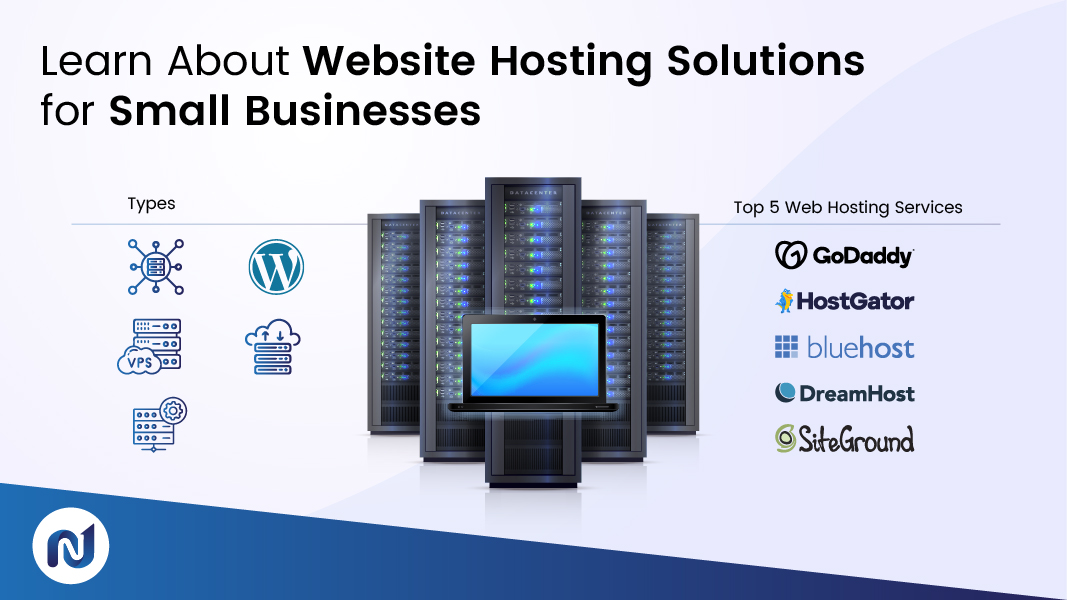
Are you a small business owner in Canada looking for website hosting solutions? If so, you’ve come to the right place. In this blog post, we’ll explore some of the best hosting options available for small businesses in Canada. By the end of this post, you should better understand what hosting solution will best suit your needs. So let’s get started!
What Is Web Hosting?
Web hosting is a service that allows you to host your website on the internet. It’s like renting a space online, where your website can be stored and accessed by anyone with an internet connection.
Web hosting services provide the infrastructure needed for your website to be seen online. This includes servers, software, and data centers. Many web hosting services are available, each offering different features and services.
A website is essential for any business, as it lets you make your presence known online and helps customers find out more about your products and services. Web hosting is often the first step to setting up a business website. It provides the storage space and other necessary infrastructure to ensure your website is available online.
Types of Website Hosting Solutions Available for Small Businesses in Canada
When it comes to hosting your website in Canada, several options exist. The most popular ones include shared hosting, managed WordPress, cloud hosting, VPS hosting, and dedicated hosting.
Shared Web Hosting
This is the most affordable and popular choice for small business web hosting. It allows you to share resources with multiple websites, which helps keep costs down. However, you won’t have as much control over the server settings, and performance may not be optimal. All web hosts provide this hosting option.
- Pros: Affordable, easy to set up, and great for beginners
- Cons: Limited control over server settings and performance may not be optimal
Managed WordPress Hosting
This type of hosting is specifically designed for WordPress websites. It provides optimized server settings and features to ensure your WordPress website runs smoothly and efficiently. It’s more expensive than shared hosting but offers better performance and reliability for small business websites built using WordPress CMS.
- Pros: Optimized for WordPress and better performance than shared hosting
- Cons: More expensive than shared hosting and site owners do not get complete control to add plug-ins and modify the server
VPS Hosting
VPS hosting is best suited for businesses that need more control and flexibility. With this type of hosting, you get a virtual private server (VPS) that is isolated from other users. This provides better security and performance. Unlimited bandwidth and storage are also available, making it ideal for businesses with large amounts of content and e-commerce websites. This is also good for small business owners who want to host multiple websites on the same server.
- Pros: Highly secure, reliable, and flexible
- Cons: More expensive than other hosting plans and may be too complex for beginners
Cloud Hosting
Cloud server hosting is an excellent option if you need more flexibility and scalability for your website. With this type of hosting, you can access resources from multiple servers in a cloud network, which provides better performance and reliability. With their pay-as-you-go model, you only pay for the resources you use.
- Pros: Highly scalable, reliable, and secure
- Cons: Expensive and may be too complex for beginners
Dedicated Server Hosting
Dedicated hosting is the most expensive and powerful type of web hosting. It gives you complete control over your server, allowing you to customize it per your needs. This is the ideal option for businesses that need to scale up quickly and require high performance and security. It will be overkill for most small businesses, though.
- Pros: Highly secure, reliable, and robust, as well as complete control of the server
- Cons: Expensive and requires server management expertise and experience
Factors to Check When Selecting the Best Web Hosting Company
Choosing the right web hosting service is essential for any small business. Factors you should consider include cost, features, server speed and reliability, customer service, and security. It’s also a good idea to check reviews of the web hosting service provider to ensure they have a good reputation.
- Web Hosting Server’s Uptime: Uptime is one of the most important factors when choosing a web hosting provider. Uptime refers to the amount of time your website is available and accessible. Look for a web hosting provider with an uptime guarantee of 99.95% or above to ensure your website is always available.
- Server Speed and Reliability: Server speed and reliability are also important factors when selecting a web hosting provider. The faster your website can load, the better your users’ experience will be.
- Security: Security is an essential factor when choosing a web hosting provider. Look for secure data centers with advanced firewalls, malware detection, and DDoS protection.
- Control Panel Access: Access is necessary when choosing a web hosting provider. Look for providers that offer easy-to-use control panels with various options to manage your website.
- Customer Service: Good customer service is vital for any business, especially when it comes to web hosting. Your provider should offer 24/7 customer support through live chat support and/or phone support to get help when needed.
- Price: Price is always essential when selecting a web hosting provider. Look for providers that offer affordable and competitive prices on their hosting packages. Also, look for providers that offer discounts or special offers to help you save money.
- Technical Specifications: Look at the technical specifications of the web hosting provider. Does your provider offer unlimited storage, unlimited bandwidth and email accounts, multiple programming languages, databases, SSL certificates, and Content Delivery Networks (CDN)? Make sure they use the latest versions of software and web technologies.
- Online Reviews: Before selecting a web hosting provider, check online reviews to ensure they have good ratings and customer feedback. Reviewing customer reviews will give you an idea about their service quality, customer service, and support.
Top 5 Web Hosting Services for Small Business Web Hosting in 2023
Below are some of the top web hosting services for small businesses.
GoDaddy
GoDaddy is the number one web hosting company for small businesses. They offer reliable and secure servers, a powerful control panel, 24/7 customer support and competitive pricing.
All their web hosting plans include a free SSL Certificate, 24/7 network security, global data centers, daily free backups, and a one-click restore feature with a 99.9% uptime guarantee. They offer free domain registration for three years and a 30-day money-back guarantee on all hosting plans.
A recent third-party study found that GoDaddy is the global leader in VPS hosting, with a market share of 62%.
HostGator
HostGator is one of the most popular web hosting providers for small businesses. They offer a wide range of hosting plans with unlimited storage, bandwidth, and email accounts.
All their web hosting plans include a free SSL certificate, 24/7 customer support, global data centers, and a 30-day money-back guarantee. An uptime promise of 99% backs their hosting plans along with one year of free domain registration and migration.
Bluehost
Bluehost is one of the oldest web hosting providers and offers various hosting plans tailored for small businesses.
All their hosting plans come with unlimited storage, unlimited bandwidth and email accounts. They offer 24/7 customer support and a free domain name for one year with all their hosting plans.
Their servers are secure and reliable with a 99.9% uptime promise, global data centers, and daily free backups. They also provide a free SSL certificate and CDN on all hosting plans.
WordPress.org highly recommends Bluehost as one of the leading providers for WordPress users. Bluehost also gives the highest commissions on reseller hosting services.
DreamHost
DreamHost is a reliable and secure web hosting provider with a wide range of hosting plans for small business owners.
All their shared hosting packages include a one-click WordPress install, unlimited storage, unlimited bandwidth, and email accounts.
They offer 24/7 customer support, a free domain name for one year and a 97-day money-back guarantee on their business hosting plans. They also offer a 100% uptime promise and daily backups with global data centers.
SiteGround
SiteGround is a great web hosting company for small businesses. They offer reliable and secure servers, unlimited storage, unlimited bandwidth and email accounts, 24/7 customer support, and competitive pricing.
All their web hosting plans include a free SSL certificate, global data centers, daily backups and a 99.9% uptime promise. They also offer free domain name registration for one year, free website migration, and a 30-day money-back guarantee on all hosting plans.
You can host multiple websites, unlimited domains, and unlimited databases with their business hosting plan.
Steps to Migrate Your Small Business Website to a New Hosting Provider
Once you have selected the best web hosting provider for your small business, it is time to migrate your website to the new hosting company. Here are the steps to help make the website migration process easier and stress-free.
- Back Up Your Website: The first step is to back up your existing website so that all content, images, and other files are available for migration.
- Choose a Migration Method: There are several ways to migrate your website, including manual migration, plugin migration, and migration services from hosting providers. You should choose a method that best suits your needs.
- Set Up Your New Hosting Account: Once you have chosen a migration method, it’s time to create a hosting account with your new host. Make sure to provide the correct details.
- Migrate Your Website: Once you have created the hosting account, it’s time to migrate your website files, images, and content per the chosen migration method.
- Update DNS Settings: The last step is to update the DNS settings of your domain name to ensure that it points to the new hosting server.
Following these simple steps, you can easily migrate your small business website from one hosting provider to another with minimal effort and downtime. Make sure to choose a reliable web hosting provider with great web hosting features, customer support, and competitive pricing.




